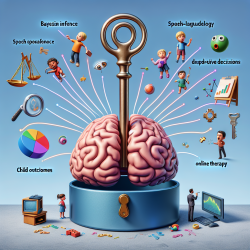Introduction: Embracing Bayesian Inference
In the realm of speech-language pathology, making informed, data-driven decisions is paramount for achieving the best outcomes for children. The research article "Bayesian inference for psychology. Part I: Theoretical advantages and practical ramifications" by Wagenmakers et al. (2017) offers a compelling case for adopting Bayesian inference as a robust alternative to traditional p-value-based hypothesis testing. This approach not only enhances the precision of our conclusions but also aligns with the dynamic nature of data collection in educational settings.
Theoretical Advantages of Bayesian Inference
Bayesian inference provides a framework that allows practitioners to incorporate prior knowledge and continuously update beliefs as new data becomes available. This is particularly beneficial in speech-language pathology, where ongoing assessments and interventions can yield new insights. The Bayesian approach offers several advantages:
- Quantification of Evidence: Unlike p-values, Bayesian methods quantify evidence, providing a clearer picture of the strength of the data supporting or refuting a hypothesis.
- Flexibility in Hypothesis Testing: Bayesian inference allows for the testing of complex models and hypotheses, which is crucial in understanding the multifaceted nature of speech and language disorders.
- Incorporation of Prior Knowledge: Practitioners can use existing data and expert knowledge to inform their analyses, leading to more personalized and effective interventions.
Practical Ramifications for Practitioners
For practitioners at TinyEYE and similar organizations, the adoption of Bayesian inference can revolutionize the way we approach therapy and assessment:
- Continuous Monitoring: Bayesian methods allow for real-time monitoring of a child's progress, enabling timely adjustments to therapy plans.
- Improved Decision-Making: By quantifying the evidence for or against specific interventions, practitioners can make more informed decisions, ultimately leading to better outcomes for children.
- Enhanced Communication: The clarity and precision of Bayesian results can improve communication with parents, educators, and other stakeholders, fostering a collaborative approach to therapy.
Encouraging Further Research and Application
While the benefits of Bayesian inference are clear, its adoption requires a shift in mindset and practice. Practitioners are encouraged to explore the use of Bayesian methods in their work, leveraging resources such as JASP, a user-friendly software that facilitates Bayesian analysis without the need for complex programming skills. By embracing this approach, we can enhance the quality and impact of our interventions, ultimately improving the lives of the children we serve.
To read the original research paper, please follow this link: Bayesian inference for psychology. Part I: Theoretical advantages and practical ramifications.










